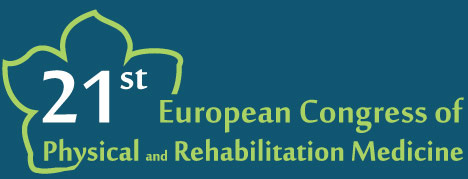A. Topics of General Interest in PRM
-
A.1. Field of Competence
-
A.2. WHO-ICF (International Classification of Functioning, Disability and Health)
-
A.3. Assessment
-
A.4. Diagnostics
-
A.4.1 – Ultrasound
-
A.4.2 – Urodynamic and manometrics
-
A.4.3 – Electro-diagnostics
-
A.4.4 - Kinesiology
-
A.4.5 – Motion analysis; Gait analysis; Posturography
-
A.5. Main health interventions in PRM 1 (information, education, medical treatments, PRM programs)
-
A.6. Main health interventions in PRM 2 (including therapeutic exercise and physical modalities, isokinetic, Neuromuscular Functional Electrical Stimulation; biofeedback, noninvasive ventilation, Transcranial Magnetic Stimulation)
-
A.7. Outcome Measurement in PRM; Quality of Life (QoL) measurement
-
A.8. Orthotics and Prosthetics; Wheelchairs and Assistive Technology
-
A.9. Augmentative Devices for the Disabled Persons; Advanced Assistive Technologies in PRM
-
A.10. Ergonomic Considerations in House, Workplace and other conditions of Disabled Persons
-
A.11. Sports; Sports for the Disabled Persons
-
A.12. Role of Complementary Medicine in Rehabilitation (balneology, manual medicine, mesotherapy, acupuncture, etc.)
-
A.13. Research in PRM
-
A.14. Ethical Considerations in PRM
-
A.15. Other in Biosciences in Rehabilitation, Biomedical Rehabilitation Sciences and Engineering, and Human Functioning Sciences
B. PRM and Disorders of Nervous System in people with:
-
B.1. Stroke
-
B.2. Acquired Brain Injury
-
B.3. Nervous system diseases
-
B.3.1 - Autoimmune and inflammatory neurological conditions (e.g. Multiple Sclerosis)
-
B.3.2 - Movement disorders and Neurodegenerative diseases (e.g. Parkinson’s disease)
-
B.4. Diseases and Trauma of the Spinal Cord
-
B.5. Neuropathies, Myopathies, Neuromuscular disease, and Peripheral Nerve Lesions
-
B.6. Spasticity
-
B.7. Disorders of Cognition & behavior (including neuropsychological assessment)
-
B.8. Vegetative states, minimally conscious and low awareness states
C. PRM and Orthopaedic and Musculoskeletal Disorders in people with:
-
C.1. Musculoskeletal Disorders, including work-related musculoskeletal disorders and soft tissue problems (e.g. fibromyalgia, chronic fatigue syndrome, etc.)
-
C.2. Spinal Disorders (including back pain)
-
C.3. Osteoarthritis, crystal arthritis and degenerative musculoskeletal conditions
-
C.4. Inflammatory and autoimmune conditions (e.g. Rheumatoid Arthritis and SLE, etc.)
-
C.5. Osteoporosis and other osteo-metabolic diseases
-
C.6. Trauma and Multi-trauma
-
C.7. Reconstructive surgery
-
C.8. Limb loss (including congenital causes) and Amputations
-
C.9. Complex Regional Pain Syndromes
-
C.10. Temporomandibular Dysfunction
D. PRM in Other Specific Disabling Conditions in people with:
-
D.1. Cardiac and Vascular diseases
-
D.2. Respiratory Diseases
-
D.3. Cancer
-
D.4. Chronic Pain
-
D.5. Elderly patient (including the immobile patient; frailty, sarcopenia, risk of falls)
-
D.6. Children with disability, transition from childhood to adulthood (cerebral paresis, spina bifida etc.)
-
D.7. Postural Instability and Recurrent Falls
-
D.8. Needing Wound Care (promotion of tissue viability, prevention and treatment of Pressure Sores)
-
D.9. Bladder and Bowel Disorders
-
D.10. Disability and sexuality
-
D.11. Language, Speech and Swallowing disorders
-
D.12. Medico-legal assessment
-
D.13. Organ transplantation
-
D.14. Other (i.e. rehabilitation in major burns, metabolic disorders, psychiatric disorders, hearing, visual and other, sensory disorders, etc.)
E. Integrative and Clinical Rehabilitation Sciences - PRM
-
E.1. Services Research
-
E.2. Comprehensive Intervention Research
-
E.3. Administration, Management; PRM Health Accounts
-
E.4. Short clinical research on best care including guidelines, organization, coordination, and education
-
E.5. Standards and guidelines for the provision of best care (including Evidence Based Medicine)
-
E.6. Quality management
-
E.7. Education: evidence based medicine, training of professionals
-
E.8. Development and evaluation of the PRM team and multi/inter disciplinary care
-
E.9. Community-based rehabilitation issues
-
E.10. Networks and pathways
-
E.11. Rehabilitation as social innovation: addressing sustainable development challenges




